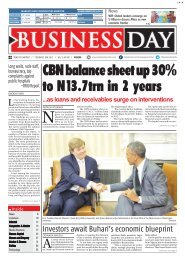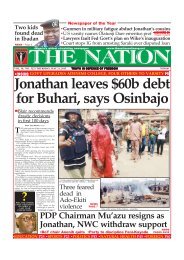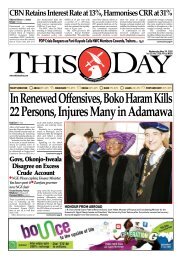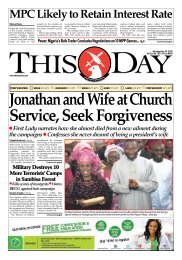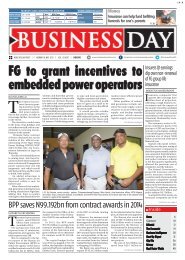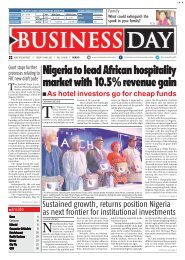You also want an ePaper? Increase the reach of your titles
YUMPU automatically turns print PDFs into web optimized ePapers that Google loves.
dency on My 29, 2015. But like the proverbial<br />
Whiteman that defecates on the chair before<br />
vacating his seat, Jonathan is bent on leaving<br />
behind some mess for the incoming administration.<br />
The All Progressives Congress (APC) has<br />
raised concern over what it called last minute<br />
looting of the nation’s resources, secret sales<br />
of government property and massive recruitment<br />
into the public service by the departing<br />
Peoples Democratic Party (PDP) led Federal<br />
Government. While these might not be entirely<br />
true, it behoves the Jonathan administration<br />
to tread with caution, its last days in<br />
office, in order not to create problems for the<br />
incoming administration.<br />
And one of such likely problems is the<br />
planned handover of the job of protecting the<br />
nation’s oil/gas pipelines and waterways to<br />
former militants and self determination<br />
groups by President Jonathan. Barring any last<br />
minute change, former Niger Delta militants/<br />
warlords, Government Ekpemupolo (aka<br />
Tompolo), Mujaheedin Asari-Dokubo and<br />
Chief Bipobiri Ajube (aka Gen. Shoot-At-Sight)<br />
together with Dr Frederick Faseun and Ganiyu<br />
Adams of Oodua Peoples Congress (OPC),<br />
should be in charge of protecting these vital<br />
economic facilities. They were billed to take<br />
over from the various security agencies yesterday.<br />
Looking at the implications of contracting<br />
out such important duty of government to private<br />
individuals/companies, to the security<br />
of state, one would have expected President<br />
Jonathan to leave the decision on the<br />
outsourcing of such assignment to the incoming<br />
administration. The pipelines and waterways<br />
are treasured national assets that should<br />
not be placed in the hands of anybody or<br />
group of people other than agents of the state.<br />
Considering the cry over poor funding of<br />
our armed forces and other security agencies,<br />
the N9.3 billion to be expended on the pipeline<br />
protection contract for the former militants<br />
could go a long way in adequately arming<br />
the Nigerian Navy and the Nigeria Police<br />
to provide the needed security for these pipelines<br />
and our waterways. These are bodies/<br />
organizations statutorily empowered to carry<br />
IT is highly debatable whether it is proper<br />
to set an agenda for progress and development<br />
for an elected government which Ipresumably got the highest number of votes<br />
on the basis of its manifesto. However it has<br />
been a tortuous journey to the moment when<br />
a ruling party in Nigeria could be voted out of<br />
power for poor performance. There are many<br />
gaps to fill and mistakes to correct such that<br />
patriots cannot afford to be aloof. The moment<br />
calls on hands on deck for a fresh beginning.<br />
In this respect one is happy that the President-elect<br />
General Muhammadu Buhari has<br />
already promised to ‘lead a government<br />
founded on values that promote and protect<br />
fundamental human rights and freedoms, the<br />
supremacy of the Constitution and rule of<br />
law…and to build a country that is fair to all<br />
its citizens…respects human dignity, promotes<br />
human development…equality…and<br />
freedom….’<br />
I see here the recognition of some of our<br />
past weaknesses which include wrong philosophy<br />
of governance or inappropriate ideology<br />
of development, exclusion of the state from<br />
economic activities, low citizenry participation,<br />
disregard for the provisions of the constitution,<br />
infrastructural decay, rural neglect,<br />
corruption, insecurity, unemployment especially<br />
youth’s to mention just a few.<br />
While it needless to ask for a proper focus<br />
on these problems, the year 1999 when the<br />
country returned to democracy provided opportunity<br />
for a fresh start but which was<br />
botched by the ruling elites by taking the<br />
wrong road. As I observed in my book Power<br />
of Youth and Other Essays on the Political Economy<br />
of Nigeria the wrong step was informed by a<br />
number of factors -both local and international<br />
that must guided against henceforth. These<br />
include influence of international politics of<br />
ideology as was re-ignited by Margaret<br />
Thatcher in Britain and Ronald Reagan in the<br />
USA in the 1980s to the effect that the market<br />
is the engine of development and the state has<br />
no business with doing business; the fall of<br />
USSR and the belief that socialism was dead;<br />
the influence of western media in projecting<br />
the capitalist ideology across the globe in the<br />
name of globalization, the persuasive activities<br />
of the IMF, the World Bank on developing<br />
countries to embrace western market<br />
based model of development, the poor knowledge<br />
and lack of creative thinking and development-oriented<br />
nation-building local elites<br />
as well as emergence of false prophets in the<br />
That pipeline<br />
protection contract<br />
22 THE NATION TUESDAY, APRIL 28, 2015<br />
COMMENTS<br />
AFTER six years of lack-lustre performance,<br />
President Goodluck Jonathan is<br />
expected to relinquish Nigeria’s presiout<br />
the job of protecting these facilities, and if<br />
for whatever reason they have been unable to<br />
do so effectively, the solution is not to<br />
outsource their duties, but to ensure they carry<br />
out such duties.<br />
Moreover it is doubtful if any of these contractors<br />
have any requisite knowledge or training<br />
on how to carry out the assignment. Giving<br />
them the contract amounts to merely giving<br />
‘job to the boys’ to keep them quiet or<br />
away from crime. While it is good and even<br />
necessary for government to either provide<br />
gainful employment for all or create a conducive<br />
environment for everybody so willing<br />
to be gainfully employed, this kind of job being<br />
given to Tompolo and others is beyond<br />
their level of competence and should be<br />
stopped immediately.<br />
If Jonathan insists on going ahead with the<br />
contract, the incoming administration on taking<br />
over power should halt the implementation<br />
as soon as possible. If the government<br />
feels there is a need for a special force to be in<br />
charge of protecting these facilities, it should<br />
create such and put under its control, just like<br />
it created the Federal Road Safety Corps (FRSC)<br />
and the National Drug Law Enforcement<br />
Agency (NDLEA) to take care of road safety<br />
matters and drug law enforcement in the country.<br />
I had complained about this contract in the<br />
past when it was first mooted. I have nothing<br />
personal against the people involved, but I<br />
believe that the security of state, including that<br />
of the citizens and vital state facilities/resources<br />
should not be put in the hands of private<br />
individuals. And considering the past<br />
activities of some of those benefiting from the<br />
contract, I believe it amounts to rewarding<br />
criminality if those who had at one time or<br />
another taken up arms against the government<br />
in the past, should be so rewarded, if at<br />
all they should be rewarded, the Niger Delta<br />
amnesty programme notwithstanding.<br />
While the incoming General Muhammadu<br />
Buhari’s administration has promised not to<br />
probe Jonathan or any of his predecessors, this<br />
type of pipeline protection contract could<br />
leave the new government with no choice than<br />
to look into the books of the outgoing government.<br />
And Nigerians would definitely understand<br />
if the new government came to this.<br />
There are some actions of the Jonathan government<br />
that would and should definitely be<br />
looked into. No responsible government<br />
would want to close its eyes to the disappearance<br />
of 20 billion USD oil earning not remitted<br />
into the federation account by the Nigeria<br />
National Petroleum Corporation (NNPC) as<br />
alleged by the former governor of Central<br />
Bank of Nigeria, Alhaji Sanusi Lamido Sanusi,<br />
the Emir of Kano.<br />
Sanusi, as CBN government made the allegation<br />
and instead of Jonathan looking into it<br />
fired the apex bank boss. It is believed that<br />
Sanusi’s appointment as Emir of Kano probably<br />
prevented Jonathan from further persecuting<br />
for making the revelation.<br />
Long travel on the wrong road<br />
By John I. Abhuere<br />
corridors of power many of them novices in<br />
development issues or nation-building matters.<br />
One of the results was the wrongly taken<br />
private–sector market driven economic patha<br />
somewhat breach of the constitution. Rather<br />
than being guided by the provisions of the<br />
1999 constitution, the government adopted the<br />
wrong philosophy of excluding the state from<br />
economic activities in the name of globalization<br />
of which privatization is a major plank. It<br />
was a step informed by blind loyalty and uncritical<br />
embrace of an inappropriate ideology<br />
that was bereft of reason, historical and constitutional<br />
support. In this way the state was<br />
sent on leave of absence for 16 years.<br />
Yet according to the 1999 Constitution, the<br />
‘security and welfare of the people’ shall be<br />
the primary purpose of government and the<br />
‘participation of the people in their government’<br />
should be ensured. Also the state ‘’shall<br />
harness the resources of the nation to promote<br />
national prosperity and an efficient, a dynamic<br />
and self reliant economy’; and it should ‘control<br />
the national economy in such manner as<br />
to secure the maximum welfare, freedom and<br />
happiness of every citizen on the basis of social<br />
justice and equality of status and opportunity’.<br />
It is clear from the foregoing that the constitution<br />
envisages state intervention but instead<br />
of this the elites excluded the state and went<br />
ahead with a bogus privatization which saw<br />
the sale of public enterprise that swelled the<br />
unemployment load without any attempt to<br />
establish labor-intensive industries. What<br />
stopped us from having a national carrier,<br />
more refineries, and agro –based industries<br />
except economic heresy from abroad?<br />
But such exclusion of the state was bad development<br />
–economics and a-historical. It is<br />
akin to denying the best player of a football<br />
team from playing in a crucial competition<br />
on the ground that it is not right to win through<br />
him. The state in developing countries has<br />
more muscle than the private sector to lead<br />
and drive the economy. The private sector is<br />
still at its infancy and thus weak. Values such<br />
as trust, honesty, and discipline are in short<br />
supply in Nigeria. Above all the purpose of<br />
President-elect, Buhari is right in saying he<br />
would look into the books on this matter once<br />
he assumes office on May 29, 2015. Nigerians<br />
would understand why. We need to know who<br />
was saying the truth; Sanusi or Jonathan’s government<br />
that says no $20billion was missing.<br />
Corruption is at the root of our problems in<br />
this country and until issues like the alleged<br />
missing oil money is satisfactorily dealt with<br />
and the truth uncovered, and punishment<br />
meted out if necessary; corruption will continue<br />
to thrive in Nigeria. $20billion is big<br />
money and no effort must be spared by Buhari<br />
to uncover the truth and no sacred cow must<br />
be left untouched if at all somebody or some<br />
people tampered with that money.<br />
The president-elect should also look into the<br />
bogus oil subsidy being paid by the federal<br />
government to importers of petrol. This is<br />
another platform where Nigeria is being defrauded<br />
of huge sums of money.<br />
The fraudulent practices are not of monetary<br />
nature alone. There is so much fraud in our<br />
electoral system which if not stopped could<br />
derail this democracy. The last general elections<br />
and the sham that took place in Rivers<br />
and Akwa Ibom States just to mention a few,<br />
in the name of election was enough to show<br />
that all is not well with our democracy in spite<br />
of the worldwide kudos given to the Independent<br />
National Electoral Commission (INEC)<br />
and its chairman, Attahiru Jega for a job well<br />
done.<br />
It was glaring that no election took place in<br />
these two states and yet results, votes, running<br />
into millions were declared. Who did<br />
the voting? While the judiciary should be left<br />
alone to determine whether it was right for<br />
INEC to declare result in the face of so many<br />
irregularities in these states, conscious efforts<br />
should be made by the Buhari administration<br />
to reform our electoral system such that votes<br />
would count. It would be wise for the incoming<br />
administration to look into the Justice<br />
Uwais Commission report in this regard.<br />
As Jonathan prepares his hand over notes, it<br />
is hoped that the president would make himself<br />
available to the new government for clarification<br />
on some of his actions if need be. Let<br />
us thank the president once again for that concession<br />
speech. For once in six years, he did<br />
something good.<br />
the state is to provide for the security, and<br />
welfare of the people and thus in a better position<br />
to mobilize necessary resources to do<br />
the needful including the provision of employment.<br />
Most of the problems of today were all<br />
there - unemployment, insecurity, rural neglect,<br />
infrastructural deficiency, corruption etc<br />
and they required strong frontier attack than<br />
the indirect approach of the market adopted<br />
by the ruling elites.<br />
It is needless to remind us that the country<br />
has been in serious economic crisis long before<br />
1999.And the state has a duty to resolve<br />
the crisis. In the history of nation-building,<br />
the state has always led in the mobilization of<br />
resources to lay appropriate infrastructure in<br />
order to drive growth and development. The<br />
USA used the approach in its formative years<br />
in the 18 th , 19 th century and would use it in the<br />
1920s & 30s era of the great depression to<br />
stimulate recovery, and even in this century-<br />
2008 to resolve serious financial crisis. The<br />
Marshal plan for Europe after the World War<br />
11 was nothing else than massive state intervention.<br />
Dubai, Singapore, China etc are<br />
driven on the principle of government-led<br />
development efforts.<br />
The new government must not give room<br />
to the false prophets of development to misdirect<br />
the country again because they are novices<br />
in nation-building in developing countries.<br />
They lack the ability for creative thinking<br />
and adaptation of global ideas to local<br />
condition. They chase shadows rather than the<br />
substance of solving the daily problems of our<br />
country. The new government must work out<br />
an appropriate philosophy or ideology of development<br />
based on justice, equity and fairplay<br />
to be preached and driven by a well assembled<br />
development oriented and nationalunity<br />
conscious elite.<br />
Another serious mistake of the past was the<br />
alienation of majority citizens through barren,<br />
harsh and unrewarding policies. One of<br />
the consequences was low citizenry participation<br />
which is one of the reasons for policy<br />
failure of the era 1999-2015.<br />
Any casual observer of the Nigerian scene<br />
would appreciate that many Nigerians did not<br />
bond with the development vision of the government<br />
since 1999. For instance many people<br />
did not understand what NEEDS, 7-point<br />
agenda and Transformational agenda were all<br />
about. Yet without people understanding and<br />
buying into the leadership vision, nothing<br />
much can be achieved in the development<br />
arena. The mobilization of the citizen to share<br />
in the leadership vision should be the starting<br />
point of this administration.<br />
Because the country was on the wrong road,<br />
many things went wrong too: corruption, injustice,<br />
immorality, profanity, unethical conduct<br />
etc were on the increase. She failed or<br />
was unable to appreciate where the shoes<br />
pinched most. Otherwise national statistics<br />
had since revealed that about 60% of the<br />
nation’s active population are youths and that<br />
unemployment was very high in the country<br />
– 40% (about 40 million) people most of them<br />
youths, thereby becoming a source of threat<br />
to the economy. With over 40 million unemployed,<br />
one needs not to be specialist to know<br />
that the country was sitting on a keg of gun<br />
powder. All these largely explain the rise of<br />
more militia groups, kidnapping groups and<br />
terrorist sects such as Boko Haram. And they<br />
also explain the sprawling poverty and underdevelopment<br />
across the country today. All<br />
these must be given utmost attention through<br />
frontal attack by the state at not the indirect<br />
approach of the market.<br />
• Abhuere, FNIM, writes from Uromi<br />
‘With over 40 million unemployed, one needs not to be specialist<br />
to know that the country was sitting on a keg of gun powder.<br />
All these largely explain the rise of more militia groups,<br />
kidnapping groups and terrorist sects such as Boko Haram. And<br />
they also explain the sprawling poverty and underdevelopment<br />
across the country today. All these must be given utmost attention<br />
through frontal attack by the state at not the indirect<br />
approach of the market’



